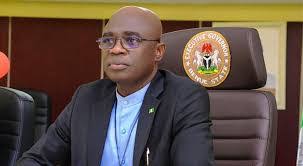Benue State Governor, Hyacinth Alia, has launched a new security outfit known as the Quick Response Squad (QRS) aimed at improving the state’s capacity to respond swiftly to security threats, particularly in rural and vulnerable areas. The squad, made up of a coalition of local and national security actors, was inaugurated on Thursday during a formal ceremony in Makurdi.
The squad comprises personnel from the Civilian Protection Guard (CPG), Nigeria Forest Security Service (NFSS), Vigilante Group of Nigeria (VGN), local hunters, and the Joint Task Force (JTF). These units will work alongside established security agencies like the Nigerian Army, Police, and Department of State Services (DSS) to carry out surveillance, offer protection, and provide rapid response in emergencies.
The official rollout of the squad was conducted by the Deputy Governor, Dr. Sam Ode, on behalf of Governor Alia. The Governor described the initiative as a proactive measure to fill gaps in the state’s security architecture. He stressed the importance of quick, coordinated responses to threats, especially in rural communities that have been frequently targeted by bandits and other criminal elements.
Governor Alia stated: “The safety of our people remains a top priority. This squad is designed to respond quickly and decisively wherever threats may arise.”
The QRS will be strategically deployed to high-risk local government areas, complementing existing law enforcement strategies. Governor Alia said the move became necessary in light of repeated attacks and growing insecurity in parts of the state.
The initiative comes at a time when Benue has witnessed violent attacks in areas such as Guma, Logo, and Ukum local government areas. These attacks, often attributed to armed herders and bandits, have displaced many residents and led to widespread loss of life and property.
Speaking at the event, Dr. Joshua Osatimehin, Commander General of the Nigerian Forest Security Service (NFSS), called for stronger collaboration between the state government and the NFSS. Represented by Ambassador John Metchie, Deputy Commander General of Intelligence, Osatimehin said the NFSS has both the legal framework and operational structure to bear arms and engage criminals in forests.
“The NFSS has the capacity to flush out criminals from forests and secure local communities. We urge Governor Alia and other stakeholders to support our mission and push for the signing of the NFSS establishment bill by the President,” Metchie said.
He emphasized that the current security challenges go beyond the capacity of vigilante groups and community guards, especially when confronted with criminals using advanced weapons.
Metchie also expressed condolences to victims of recent attacks in Benue, Plateau, and other parts of the North Central region. He praised President Bola Ahmed Tinubu for personally visiting affected areas and directing security agencies to arrest perpetrators.
According to him, the NFSS is poised to serve as the “missing link” in Nigeria’s security ecosystem, particularly in intelligence gathering, surveillance, and forest security operations.
He said: “We agree with Governor Alia that local vigilantes alone are not enough when criminals carry high-grade weapons. The NFSS is here to bridge that gap. We commend the military, police, and other agencies for their efforts, and we look forward to further collaboration.”
Metchie reiterated that once the NFSS bill is signed into law, the service will play a more effective role in joint security operations across the country.
The formation of the QRS aligns with ongoing efforts by state governments to strengthen local security networks amidst rising insecurity. In recent months, governors across the North Central and North West regions have floated similar initiatives in response to growing calls for improved protection at the grassroots level.
Benue’s security initiative is also seen as part of Governor Alia’s broader agenda to restore peace and stability in the state. He has continued to push for federal support while also approving key appointments across state parastatals and tertiary institutions aimed at improving governance and service delivery.
